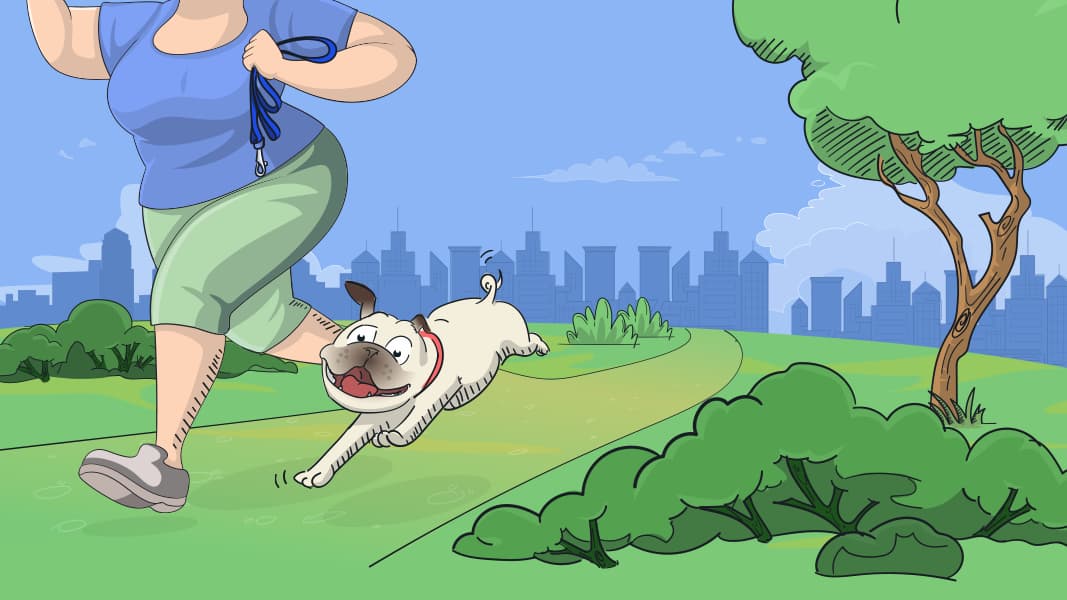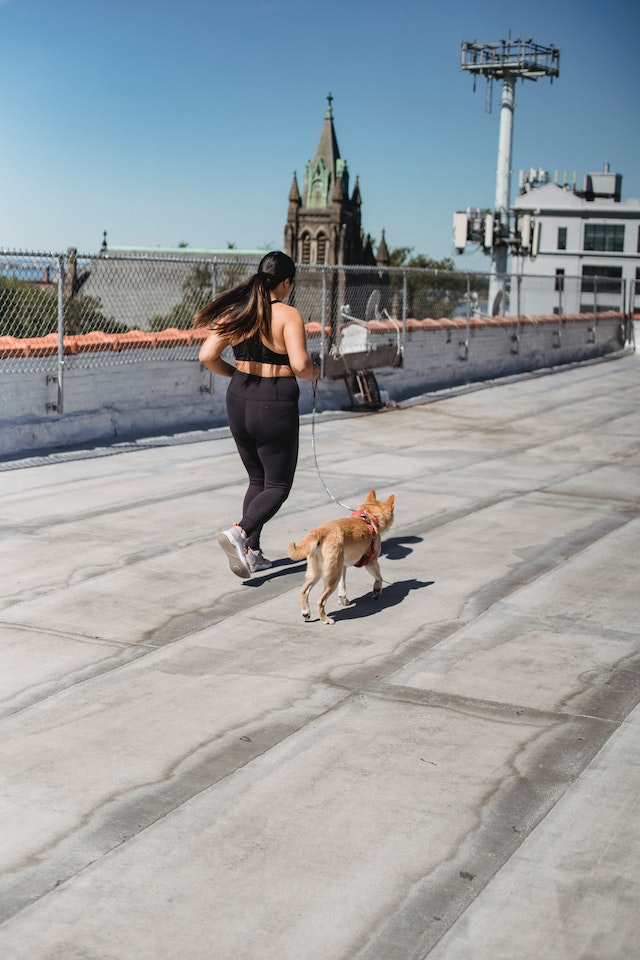

Exercising With Your Dog
Exercising your dog is great fun for both of you! Combined with a good diet and proper veterinary care, it provides the basis for a long, healthy life.

Writer Animalia Team
6 min read

The importance of exercising
There are plenty of reasons to work up a sweat alongside your pet:
- Sensory stimulation: As well as providing exercise, a good walk sharpens your dog’s brain, nose, eyes, and ears.
- The reinforcement of good habits: Walks are a great opportunity for putting your dog’s training to the test. Reward them with praise and treats every time they sit, stay, and come to order.
- Aiding in digestion: Speeding up the metabolism by walking keeps the digestive tract working smoothly while a bedtime walk ensures your dog can empty their bowels and bladder, ensuring you both a good night’s sleep.
- Helping maintain a healthy weight and joints: Walking burns calories, helping to prevent canine obesity. Excess weight can put strain on your dog’s heart and joints, leading to chronic and even life-threatening health conditions later in life.
- Maintaining good urinary health: Walking lets your dog empty their bladder regularly which is good for urinary health. Marking with urine also lets them communicate with other neighborhood dogs.
- Building a bond: Walking is a great way to spend quality time with your pet. It helps your dog learn to trust that you’ll keep them safe and that you trust them in return.
- Staving off boredom: With so much to see, hear, and smell, walks stimulate your pet’s mind and prevent boredom. Bored dogs often behave inappropriately, chewing furniture, digging up the garden, eating things they shouldn’t, or barking at passers-by.
- Keeping you healthy: Regular walking can improve your own physical and mental health. All that fresh air and extra steps pays off over time.

How much exercise does my dog need?
There is no one-size-fits-all answer to this question. It depends on your dog’s breed, health, age, and personality. Take into account the exercise requirements of different breeds when you’re choosing a puppy. Some breeds that appreciate a quieter life are Great Danes, Mastiffs, and Newfoundlands. If you lead an active lifestyle, pick a high-energy breed such as Terriers, Huskies, Labradors, and Collies (or any other working dog).
Puppies
Any owner will tell you, puppies have seemingly endless reserves of energy. They’ll sometimes zip and zoom around the house for no obvious reason at all. And, then, they’ll just as suddenly fall asleep. They like to exercise in short intense bursts, so carry this over into their walking routine. Several short walks a day are better for a puppy’s growing bones, joints, and muscles than long hikes.
Adult dogs
There’s no set time limit or prescribed routine for exercising adult dogs. Most healthy dogs benefit from between 30 minutes and two hours of activity a day. As long as they have regular access to an outdoor area for relieving themselves, they can get this exercise through long walks or several shorter walks, whatever fits your schedule. As your puppy grows out of the zoomies, start with gentle, 30-minute walks and build up from there.
Senior or ailing dogs
Unfortunately, as dogs reach their senior years they can develop a range of health issues. If they have hip dysplasia or respiratory and cardiac conditions you’ll need to find a balance between keeping them healthy and avoiding undue discomfort. Ask your vet about a suitable exercise program. Exercise provides much-needed mental stimulation as well as physical benefits, so it’s important to keep it going throughout your dog’s life.
Establishing a walking routine
While dogs love routine, they don’t understand time the same way we do. They don’t care whether you walk them first thing in the morning, at bedtime, before meals, or after meals. All they want are regular walks, quality time with you, and a chance to empty their bladder and bowels. If you’d like a blueprint to work from, start with something like this:
- A short walk before breakfast
- A short walk (or bathroom break) at midday
- A longer walk before dinner
- Another short walk or bathroom break before bed
While this routine suits the eating, urinary, and digestive patterns of healthy dogs it may not fit in with your work schedule or lifestyle. Tweak it until you find a routine that suits you, your schedule, and your pet.
Exercise equipment
The only equipment you need for an enjoyable walk with your dog is a comfortable collar, a strong leash, and poop bags. However, if your dog has a tendency to pull or is small enough to easily slip out of a collar, a dog harness is more practical. Choose one that fits snugly but isn’t too tight and has easy-release clips or buckles either at the front or at the side. A dog tag engraved with your phone number is useful in case your dog manages to get loose.
Other ways to exercise your dog
On days when your schedule is tight, it’s pouring with rain, or your dog has more energy than a walk or two can dispel, think creatively about other exercise options. Some dogs love to run alongside their owners as they cycle while most dogs love an occasional swim, especially if there’s a ball to retrieve. Swimming provides excellent low-impact exercise for dogs with joint problems. If your dog loves a game of “fetch,” switch up the fun with frisbees or chewy toys. For dogs that come from Working Group breeds, there are many dog sports they might enjoy such as lure coursing, advanced obedience, agility classes, or scent trailing.
If you really are stuck inside, spend a brisk few minutes running up and down the stairs. Most dogs love this, especially when owners and other family members join in. Don’t overdo this, however, if your dog is a short-legged or long-backed breed such as a Dachshund or Welsh Corgi. Playing hide-and-seek either with you or a favorite toy provides mental stimulation while a noisy game of tug builds muscle and strength.
And don’t forget about Animalia’s pet insurance for dogs to help with expenses in the event that rowdy plays leads to accidents or injuries. It’s coverage you’ll be happy you got. Get a quote from Animalia today to learn more.





We offer the most
comprehensive coverage
out there
car with a spare tire for life’s bumps.
Having Animalia is like a pimped-out
Rolls Royce with a swimming pool
in the trunk.



Get your pet insurance quote
Pet type
- Dog
- Cat




